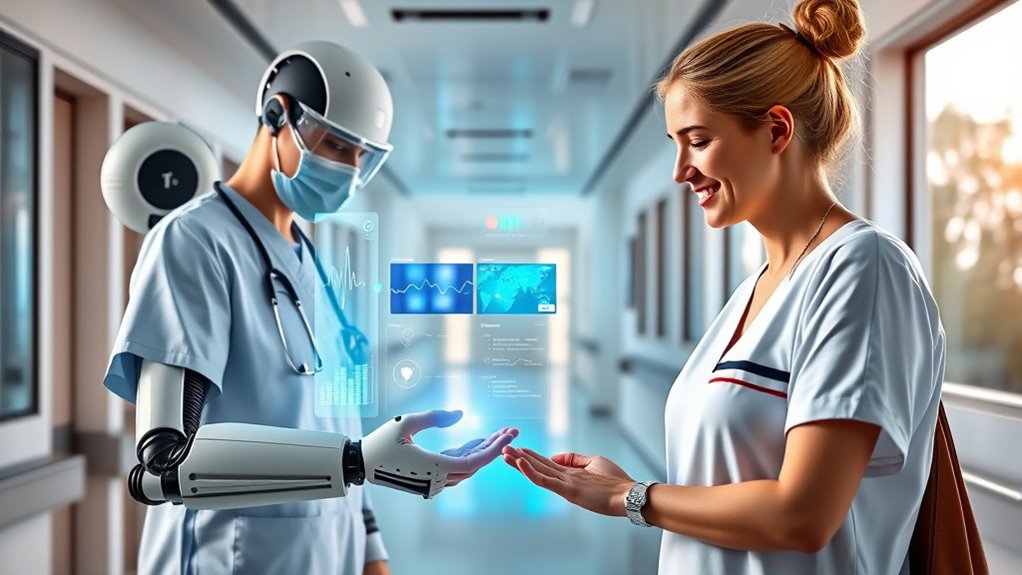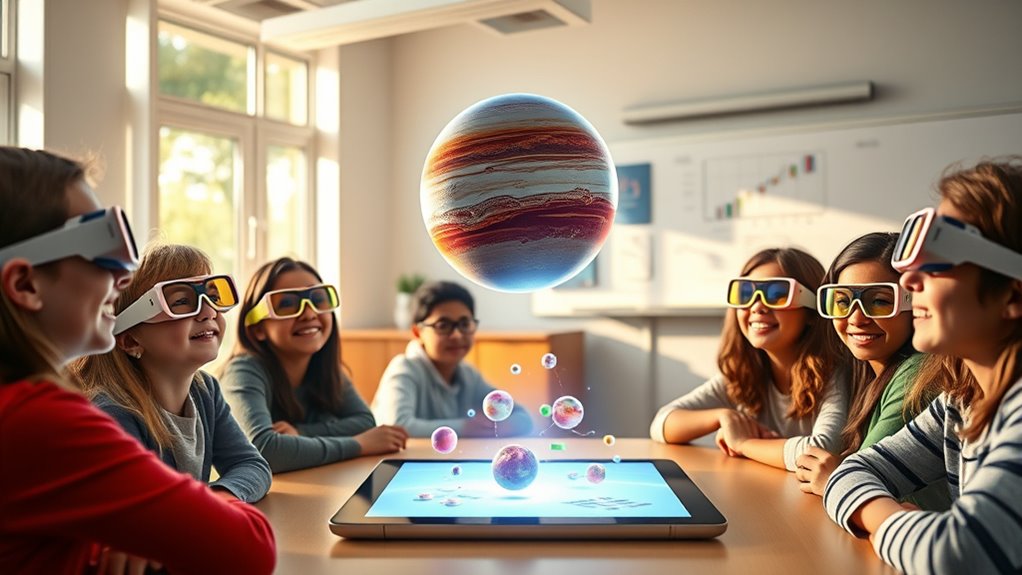AI is shaping your daily life by personalizing experiences, from tailored content and recommendations to smarter home devices that adapt to your routines. It improves healthcare with faster diagnostics and wellness insights, while revolutionizing transportation through self-driving cars and smarter traffic management. AI also enhances education with adaptive learning tools and transforms customer support with 24/7 virtual assistance. Discover how these innovations are seamlessly integrating into your world and making life easier and more connected.
Key Takeaways
- AI personalizes experiences and recommendations across streaming, shopping, and customer support, increasing engagement and satisfaction.
- Smart home devices use AI for voice control, energy efficiency, and automated environment adjustments.
- Healthcare benefits from AI diagnostics, mental health monitoring, and wearable devices for proactive wellness management.
- Transportation is revolutionized by AI through autonomous vehicles, smarter traffic management, and personalized travel planning.
- AI enhances communication and support via chatbots, virtual assistants, and multilingual, empathetic interactions.
Personalized Experiences and Recommendations

AI enables platforms to analyze your preferences and behaviors in real-time, tailoring content and suggestions specifically for you. With emotion recognition, AI can interpret your mood based on facial expressions, voice tone, or interactions, allowing for more accurate content curation. This means streaming services or shopping apps can recommend movies, music, or products that align with how you’re feeling, enhancing your experience. By understanding your emotional responses, AI adapts its suggestions to keep you engaged and satisfied. Instead of generic recommendations, you receive personalized content that resonates with your current state. This seamless customization makes your daily interactions more relevant and enjoyable, transforming how you discover new interests and manage your digital environment effortlessly. Additionally, AI in Business techniques like sentiment analysis help refine these personalized approaches, ensuring content remains engaging and responsive to your emotional cues.
Smarter Home Automation and Devices

Your home is becoming smarter and more responsive, thanks to advanced automation and connected devices. Voice control allows you to manage lights, thermostats, and appliances effortlessly, creating a seamless experience. With AI-powered systems, your devices learn your habits, adjusting settings for maximum energy efficiency and comfort. For instance, your smart thermostat can detect when you’re home or away, reducing heating or cooling to save energy without sacrificing comfort. Smart lighting systems can be scheduled or voice-activated, helping you create the perfect ambiance while conserving power. These innovations not only make daily routines easier but also promote sustainability by optimizing energy use. Additionally, smart utilities integration enhances overall home management, providing real-time monitoring and control of water and energy consumption. As a result, your home becomes more convenient, efficient, and environmentally friendly.
Enhancing Healthcare and Wellness

Thanks to recent advances, healthcare and wellness are becoming more personalized and proactive. AI-powered diagnostics enable you to get faster, more accurate health assessments, often catching issues before symptoms appear. These tools analyze vast amounts of data, helping doctors make informed decisions swiftly. Mental health monitoring is also benefiting from AI, providing real-time insights into your emotional well-being. Wearable devices track mood, sleep patterns, and stress levels, alerting you or your healthcare provider to potential concerns. This approach encourages early intervention and continuous support, making mental health care more accessible and effective. Additionally, understanding symptoms of breast cancer can lead to earlier diagnosis and treatment, significantly improving outcomes. Overall, AI’s integration into healthcare empowers you to take control of your wellness, leading to better outcomes and a healthier, more connected life.
Revolutionizing Transportation and Travel

AI is transforming transportation with self-driving vehicles that increase safety and efficiency. You can now enjoy personalized travel plans that match your preferences and schedule. Additionally, smarter traffic management systems are reducing congestion and getting you to your destination faster. Moreover, Jeep Tuning technologies are enabling customized vehicle performance upgrades, enhancing both on-road comfort and off-road capabilities.
Autonomous Vehicle Advancements
Autonomous vehicles are rapidly transforming transportation by offering safer, more efficient travel options. AI-powered cars can reduce accidents caused by human error, making roads safer for everyone. However, ethical considerations come into play, such as how these vehicles should respond in unavoidable crash scenarios. Regulatory challenges also arise as governments work to create standards for safety, liability, and data privacy. You might wonder how laws will keep pace with rapid technological advancements, and the importance of establishing clear guidelines. Manufacturers and regulators need to collaborate closely to ensure these vehicles meet safety standards while respecting ethical concerns. Additionally, understanding family dynamics and cultural heritage can influence the development of autonomous vehicle technology to accommodate diverse user needs. Despite these hurdles, ongoing advancements suggest autonomous vehicles will soon become a common, reliable part of daily life, reshaping how you travel.
Personalized Travel Planning
Have you ever wished your travel plans could be tailored perfectly to your preferences and schedule? AI now makes personalized travel planning a reality. By analyzing your interests, budget, and timeframe, it creates customized itineraries that maximize cultural exploration and budget optimization. AI-powered tools suggest destinations, activities, and accommodations suited specifically to you, saving time and money. Additionally, real-time adjustments enable travelers to modify plans on the go, enhancing flexibility and convenience. Here’s what it offers:
| Features | Benefits | Focus |
|---|---|---|
| Cultural Insights | Deep, authentic experiences | Cultural exploration |
| Budget Management | Cost-effective options | Budget optimization |
| Real-time Adjustments | Flexibility on the go | Convenience |
This approach transforms travel from generic to uniquely yours, making every trip meaningful and efficient.
Enhanced Traffic Management
Ever wondered how traffic jams and congestion could become things of the past? AI makes this possible through enhanced traffic management. Dynamic traffic signals adapt in real-time, responding to current road conditions to keep traffic flowing smoothly. AI systems analyze data from cameras, sensors, and GPS to predict congestion before it happens. With congestion prediction, traffic authorities can proactively adjust signals and routes, reducing delays. This smart coordination minimizes stop-and-go traffic, lowers emissions, and saves you time during your daily commute. AI-driven traffic management creates a more efficient transportation network, improving safety and reducing frustration. As these technologies advance, you’ll notice fewer delays and a more seamless travel experience—making your journey quicker, safer, and less stressful. Continuous monitoring of AI systems is crucial to address potential vulnerabilities and ensure reliability.
Transforming Education and Learning

Artificial intelligence is revolutionizing education by providing personalized learning experiences tailored to each student’s needs. With AI-driven curriculum, you receive tailored lessons that adapt as you progress, ensuring you’re always challenged without feeling overwhelmed. Virtual classrooms powered by AI facilitate real-time interaction, making remote learning more engaging and effective. These tools enable instructors to monitor your progress closely and adjust content accordingly, fostering a more supportive learning environment. AI also automates grading and administrative tasks, giving educators more time to focus on teaching. As a result, education becomes more accessible, flexible, and responsive. Incorporating aesthetic home decor principles into virtual classrooms can create a more inviting and comfortable learning space for students. Whether studying at home or in a traditional setting, AI helps create a more customized and dynamic learning experience for you.
Improving Customer Service and Support

AI-powered chatbots now handle customer inquiries quickly and efficiently, making interactions smoother. They also provide round-the-clock support, so you’re always assisted when needed. Personalization through AI builds stronger loyalty by making each experience feel tailored just for you. Additionally, advancements in color accuracy ensure that visual displays and interfaces are more vibrant and true to life, enhancing overall user satisfaction.
Chatbots Enhance Interaction
Chatbots have revolutionized the way businesses interact with customers by providing instant, around-the-clock support. They now handle complex tasks, such as acting as virtual therapists, offering emotional support and guidance. Additionally, they bridge language barriers through real-time translation, making communication seamless. To deepen their impact, chatbots:
- Personalize responses based on user data for more meaningful interactions.
- Use natural language processing to improve understanding and engagement.
- Offer multilingual support, enabling businesses to reach diverse audiences.
- Assist in mental health by providing empathetic, confidential conversations as virtual therapists.
- Incorporate energy efficiency data to optimize interactions and reduce unnecessary server loads, enhancing overall performance.
Through these capabilities, chatbots not only improve support efficiency but also foster trust and accessibility, transforming customer interaction into a more humanized experience.
24/7 Assistance Availability
Have you ever needed support outside normal business hours? AI-powered support systems make help available 24/7, so you don’t have to wait for business hours. These tools guarantee quick responses and constant availability, improving your overall experience. However, privacy concerns are vital; companies must safeguard your data while using AI to assist you. Ethical considerations also come into play, such as ensuring AI provides fair, unbiased support and doesn’t replace human empathy entirely. While AI enhances accessibility and speeds up resolutions, transparency about how your information is used remains essential. Balancing assistance availability with privacy and ethical standards helps build trust, making AI-driven support a valuable addition to customer service without compromising your rights.
Personalization Boosts Loyalty
When customer service is personalized to match individual preferences and needs, loyalty naturally grows. AI-driven personalization enhances support by tailoring recommendations and responses. However, maintaining data privacy is vital to prevent trust issues. Also, be aware of algorithm bias that can skew personalization, leading to unfair treatment. To optimize this approach, consider these factors:
- Prioritize transparent data privacy policies to reassure customers.
- Regularly audit algorithms to mitigate bias and ensure fairness.
- Use diverse data sets for more accurate personalization.
- Balance personalization with respect for customer boundaries to avoid overreach.
Frequently Asked Questions
How Does AI Impact Data Privacy and Security Concerns?
AI impacts data privacy and security by handling vast amounts of personal information. You need to be aware that AI systems often rely on data encryption to protect your information from breaches. Additionally, privacy regulations influence how companies collect, store, and use your data. By staying informed about these regulations, you can better understand your rights and how AI influences your privacy, ensuring your data remains secure.
What Are Ai’s Limitations in Understanding Human Emotions?
Did you know AI still struggles with emotional intelligence, accurately understanding human emotions just 30% of the time? You might think AI can develop empathy, but it primarily analyzes patterns, lacking genuine emotional awareness. Its limitations hinder true empathy development, making AI unreliable for nuanced emotional interactions. So, while AI can simulate understanding, it remains far from fully grasping complex human feelings and the subtle cues that define authentic emotional connection.
How Accessible Is AI Technology for Small Businesses?
You’ll find AI technology increasingly accessible for small businesses, thanks to affordable solutions and user-friendly tools. These innovations make it easier for you to automate tasks, analyze data, and improve customer experiences without needing extensive technical skills. Many providers now offer scalable options that fit your budget, helping you stay competitive. As a result, AI becomes a practical resource to grow your business and streamline operations effectively and efficiently.
Can AI Replace Human Jobs Completely in Various Industries?
It’s ironic, isn’t it? Many wonder if AI’s automation potential will completely replace human jobs. While AI can handle repetitive tasks, job displacement isn’t total; it shifts roles rather than erases them. You’ll find AI transforming industries, but it’s unlikely to fully replace humans. Instead, it creates new opportunities, demanding skills humans excel at—like creativity and emotional intelligence—making the future a blend of man and machine.
What Ethical Considerations Arise With AI Decision-Making?
When considering AI decision-making, you must think about ethical issues like algorithm bias and moral responsibility. You’re responsible for guaranteeing AI systems are fair and transparent, preventing biases that could harm individuals or groups. As AI makes more decisions, you need to actively oversee its processes, hold developers accountable, and address moral responsibilities. This way, you ensure AI benefits society while minimizing ethical risks and promoting trust.
Conclusion
As AI continues to reshape your daily life, it’s easy to forget how small moments often lead to bigger changes. Sometimes, a simple recommendation or smarter device can spark new opportunities or connections you never expected. In this quiet way, AI reminds you that progress isn’t always grand—sometimes, it’s the subtle, everyday improvements that truly make a difference, guiding you toward a more connected, efficient future you’re already starting to embrace.









